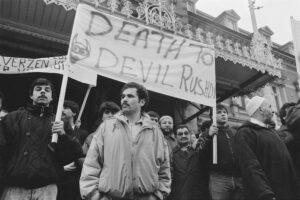Economic trouble in the Baltic
By Khaled Diab
The turmoil submerging Latvia is an example of ‘drizzle-down' economics in action and has implications for the rest of Europe.
February 2009
With a population of just over 2 million and a GDP about the size of the Bank of America bailout, the tiny Baltic state of Latvia does not make the headlines very often.
While attention is distracted by the deafening popping of bubbles in larger economies, Latvia has been imploding dramatically in one of the world's most extreme versions of ‘bubblenomics'. The latest chapter in Latvia's unnoticed turmoil occurred this weekend with the collapse of the Latvian government.
Prime Minister Ivars Godmanis, who led the march to independence but has been embroiled in corruption allegations, was forced to resign. This makes Latvia the second European country, and first EU member state, to lose its government as a result of the global economic crisis. Although Latvia has been through about a dozen governments since independence in the early 1990s, this time the public mood is very different.
The day before the collapse, disgruntled citizens of Latvia's second city Daugavpils, borrowed the (by now) world famous Arab insult, immortalised by Iraqi journalist Muntadar al-Zaidi, and hurled shoes at images of the country's parliament, the Saeima.
This was the culmination of weeks of turmoil and civil unrest, which peaked with mass peaceful demonstrations – which descended into rioting – in January.
“I'm surprised it's taken so long to get to this point,” said one protester at the January demonstrations, accusing politicians of “robbing” the people for years. This scepticism and pessimism is a far cry from the hopeful psychological crescendo of the Singing Revolution.
“Latvians are not given to protests or public displays of any sorts, [so] their recent actions indicate the gravity of the crisis,” observes Jeffrey Sommers, a professor of economic history at the Stockholm School of Economics in Riga, the Latvian capital.
And their frustration is easy to understand. The economic crisis has hit Latvia harder than other EU states. In the final quarter of 2008, the country's economy contracted by a staggering 10.5% and, the ‘Alice in Wonderland' shrinkage is expected to chop 12% off GDP in 2009, while unemployment, already high, is expected to rise by another 50%.
Until last year, Latvia, with the fastest growth rate in Europe since 2000 (reaching nearly 12% in 2006), was trumpeted as the plucky little ‘tiger' among the older EU turtles. However, the figures were illusionary in that some of the growth was really a case of climbing back from the 1990s crash. Moreover, its economic boom was based largely on a property bubble and reckless financial speculation, while macro-economic reforms imposed by the World Bank and IMF pushed resource-poor Latvia to dismantle most of its industrial and productive capacity.
Like its neighbours and other former Soviet bloc states, ‘free market' reforms have largely benefited politicians, a select oligarchy of entrepreneurs with massive political clout and foreign corporations. Rather than ‘trickle down', Latvia has experienced what could be called ‘drizzle down' economics in which the few enjoy the sunshine years while the many endure the economic storms before and after.
The immense financial crisis in Latvia prompted the IMF and the EU to offer Latvia a €7.5-billion rescue package in late December. However, the strings attached make clear that this is exclusively a bailout for banks and offers no relief for ordinary Latvians.
In fact, at a time when western economies are raising public expenditure to Keynesian levels, the most hard-pressed Latvians will be expected to pick up the tab through painful austerity measures.
But it's not just foreign pressure that's unlikely to bring change. “A new government will likely keep similar economic policies in place,” expects Sommers. “Many privileged Latvians, especially politicians, benefited from the asset inflation in real estate. Many speculators took out loans in euros and they would be hurt by a devaluation of Latvia's grossly overvalued currency.”
With other central and eastern European countries tottering on the brink of an economic abyss, capitals in western Europe are seeing a different kind of ‘red threat' coming from the east.
New battle lines are emerging between ‘old' and ‘new' EU member states. As the EU's big four – Germany, the UK, France and Italy – gathered in Berlin, the Union's eastern member states revealed plans to hold their own mini summit.
“We want to send a clear message that we support the European Union's position in favour of defending the common market and that we are against protectionism,” said Poland's Europe minister, Mikolaj Dowgielewicz, in response to aid packages unveiled in France, Spain and Italy to help their domestic automakers.
For its part, Brussels insists that the EU can weather the storm. “Europe is equipped to help the weakest economies,” said Economic and Financial Affairs Commissioner Joaquín Almunia.
The trouble is that, while funds seem to be quite readily available to bail out the financial sector, little of this has trickled into the real economy. EU governments need to find mechanisms for directly stimulating the economy and boosting employment perhaps by channelling funds directly to SMEs.
Excessive protectionism could well hurt Europe, but the single market needs to be complemented with robust common labour standards, as well as an increase in or more effective use of solidarity instruments, such as the structural funds.
This column appeared in The Guardian Unlimited's Comment is Free section on 25 February 2009. Read the related discussion.


